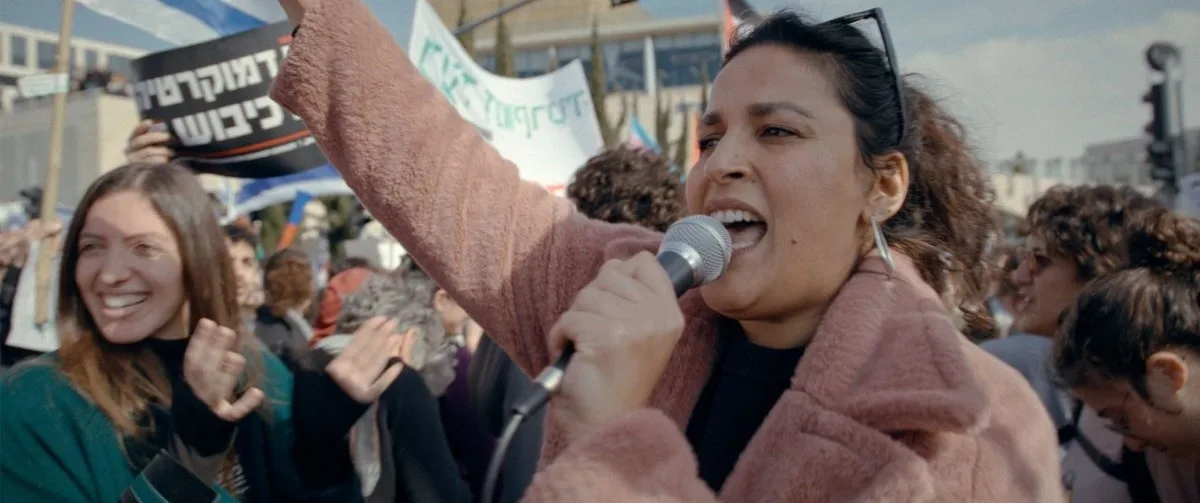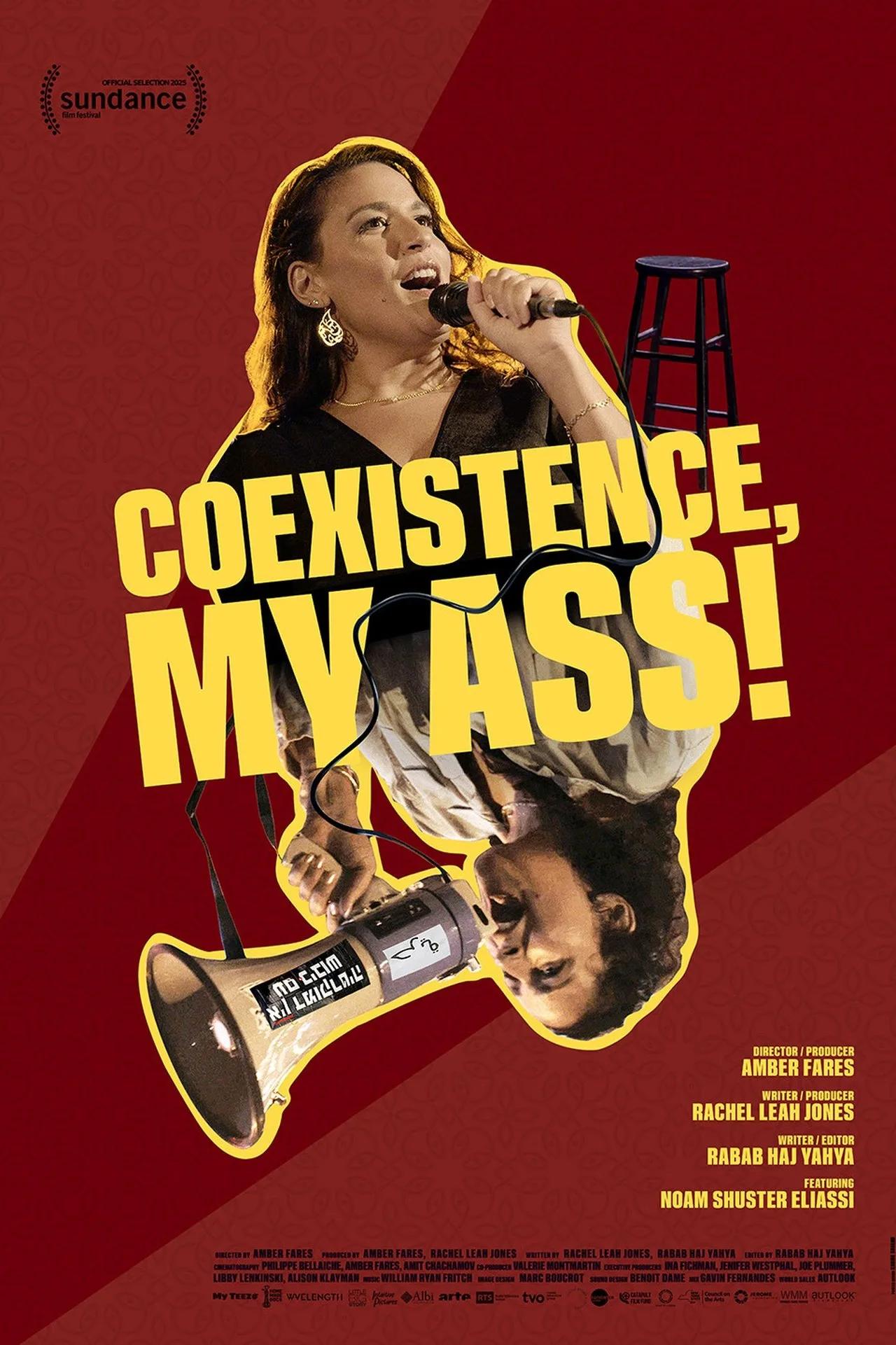If you’re going to cry about something, you might as well laugh about it too. That’s one of the key mantras of Lebanese Canadian filmmaker Amber Fares’ documentary, “Coexistence, My Ass!,” which takes its title from Israeli activist and comedian Noam Shuster-Eliassi’s one-woman show of the same name.
Shot between 2019 and 2024, the film follows Eliassi’s stand-up routine while tracing the continued escalation of violence by Israel’s government against the Occupied Palestinian territories. Fares doesn’t shy away from the horror covered by Eliassi’s material, and, though the first word of its title gestures at some form of peace, the film makes no delusions about the mawkish nature of such hopes. Accord is not possible when there’s an imbalance of power, yet “Coexistence, My Ass!” uses humor as a cathartic, light-hearted vehicle to entertain what a plausible reconciliation might look like.
Comedy is a unique form of truth-telling because it’s one of the few mediums that can wield disruption like a Trojan Horse, deploying thought-provoking ideas at a time when people have let their guard down. Eliassi seems to understand that when people go to a comedy show, yes, they’re there to be entertained. Still, amidst their dissociation, she also has the opportunity to speak to something honest. Humor and storytelling make ideas palatable in ways proselytizing does not, and it’s beautiful to witness Eliassi steward her vocation as a narrator seriously. She views it as her duty to speak for those without a voice, especially in spaces where people may retreat. The suffering of Palestinians is ever-present and incessant; the least we can do is always be willing to listen.
In between her routines, we learn more about Eliassi and about her formation. She was raised by an Iranian-Jewish mother and a Romanian Jewish father in a community called the Oasis of Peace (Neve Shalom/Wahatal-Salam). It was an intentional community and space where Israelis and Palestinians tried to live together to prove that coexistence could be a reality, not a fantasy. It’s evident that she carried this belief in her stand-up work; she was the first Jewish performer at the Palestine Comedy Festival and was invited to work on a peace project at Harvard University as a result.
Yet as the years have gone on, and the conflict has only worsened, reaching an incendiary point in the wake of October 7, she reflects on her upbringing and work with a more sober mind. She’s someone who drank the Kool-Aid of talks around co-existence and walked away wanting her idealism crushed by the reality of the shortsightedness of her fellow Israelis.
In one scene, Eliassi comments on how she recovered from COVID-19 back in Israel in a luxury hotel dubbed “Hotel Corona.” There, Palestinians and Israelis alike, united by their infection, get along in a “radical” manner, from sharing meals, playing ping pong, to dancing together. Commenting on this space, she jokes, “If they continue to get along, my comedy career will be over. Just kidding, you’ve read the news I have had for years.” This type of humor is rooted in a painful acknowledgement that such snapshots of peace are just that: fleeting, ephemeral moments that don’t last.
In another sequence, in January 2023, on election day (“The day where we elect who will control the Palestinians,” Eliassi jokes), the film’s focus shifts away from her stand-up routine to time her conducting “man on the street interviews” with Israelis who are protesting Netanyahu’s reelection. While the protesters are frustrated with Netanyahu, who was reelected despite still standing trial on corruption charges, they refuse to see how the very imperialism that they’re worried about is at all connected to the ongoing destruction of the Palestinian people. Democracy for Israel and freedom from Palestinians are separate issues in the protestors’ minds, and it’s heartbreaking to witness Eliassi try to explain this point, only for it to be hand-waved away.
In a clever moment, editor Rabab Haj Yahya cuts to an Israeli protestor who has the sign “From the river to the sea … Freedom and Democracy,” underscoring the irony of Israelis co-opting the battle cries of Palestinians who are suffering under the very same government they’re protesting against. In another scene, after being critiqued by one attendee as an “enemy of the State”, Eliassi retorts, “Do you even know what you’re defending?” The gift of Eliassi’s work is that it invites people to look inward and ask questions about what they champion, rather than go with the tide of ease and the loudest voice.
Towards the end of the film, Eliassi details the deluge of messages she received in the immediate aftermath of October 7. Online, she was heavily criticized for not immediately condemning Hamas and for not using her platform to shed light on her people’s struggles. At the same time, friends from the US would text and make sure Eliassi’s family was okay, and offer hope that the Israeli government “won’t start bombing Gaza right away.” “It’s too much to deal with all at once … give us a moment to process what happened,” Eliassi shares through tears. When we’re inundated with tragedy and the velocity of atrocity overtakes our capacity to comprehend, comedy and films like Fares act as graceful moments of processing. Throughout the film, as Eliassi’s comedy routine continues, we see the crowd shift from overt laughter to silent tears. It’s clear that Eliassi’s work has become a space that holds collective anguish, pain, and frustration. In that vein, “Coexistence, My Ass!” bears witness in a powerful way, offering viewers a pause from the noise while galvanizing them to continue the fight for justice and freedom.




















